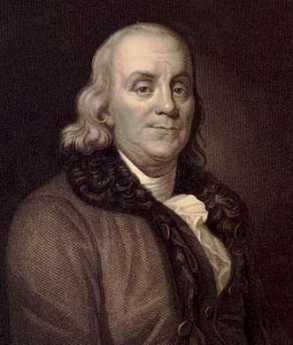Related Topics
Benjamin Franklin
A collection of Benjamin Franklin tidbits that relate Philadelphia's revolutionary prelate to his moving around the city, the colonies, and the world.

Philadelphia Medicine
The first hospital, the first medical school, the first medical society, and abundant Civil War casualties, all combined to establish the most important medical center in the country. It's still the second largest industry in the city.
Franklin Crown Soap

|
| Benjamin Franklin |
It's easy to make soap, but hard to make good soap. You just boil animal fat with wood ashes, and you get soft soap. Softsoap was sold by the barrel in the Colonies. Hard soap is made by adding salt to the mix, allowing it to be sold by the bar. The trick to all this is to know how long to boil it, how much ash of what kind, and how much salt. If you get it wrong it will be too soft or too hard, and if you have too much lye from the ashes, it will burn your skin when you wash with it. Most people made their own soap in the colonies, so they often got it wrong, because they didn't exactly know what they were doing. What they were doing was called Saponification, after the old Roman hill of Sapo. The legend is that burnt animal sacrifices in the Temple at the top of the hill would wash down and help the washerwomen in the river below get their clothes clean. The point of all this is that Josiah Franklin, the father of Benjamin and sixteen other children, was a candle maker and a soap boiler. Somehow he got the recipe right, particularly the part about adding salt, and made famously fine bars of soap with a crown stamped on them -- Crown soap. The formula was a strict family secret, the source of family discord when one sister let it out.
The point which needs reflection is that nobody in Franklin's family ever heard of potassium hydroxide, saponification, triglycerides or fatty acids. The process of achieving fame throughout the colonies -- for making a product everyone could make haphazardly -- must have involved a careful series of experiments with different fats, tallows and lards, with different amounts of ashes of various trees, and different amounts of salt. When you got it right it worked consistently, but it would have been necessary to make many experiments to get it right. To avoid repeating the same mistakes, it would be necessary to keep careful records. In other words, little Benjamin must have observed a great many examples of experimental chemistry which made him a chemist fit to talk with Lavoisier and Priestly on equal terms, even though he quit school after the second grade. His childhood was one long demonstration of a motto of Claude Bernard: "Experiment first, a theory later."
Originally published: Thursday, September 17, 1992; most-recently modified: Friday, September 20, 2019
| Posted by: Jon Gunn | Jan 20, 2010 7:15 PM |
| Posted by: LOGAN | Feb 24, 2008 11:40 AM |
| Posted by: TOBY | Feb 24, 2008 11:36 AM |